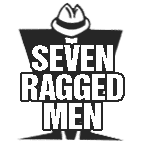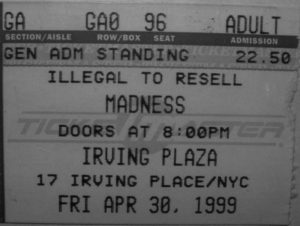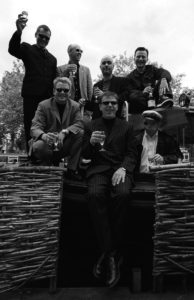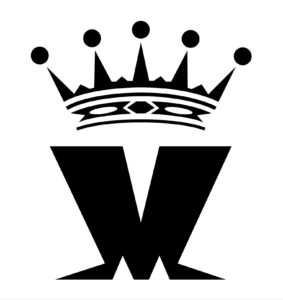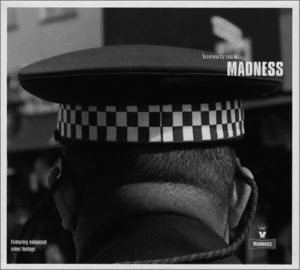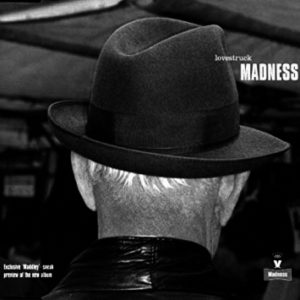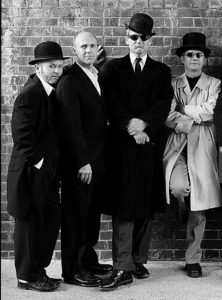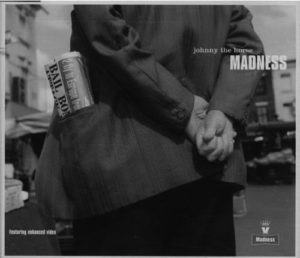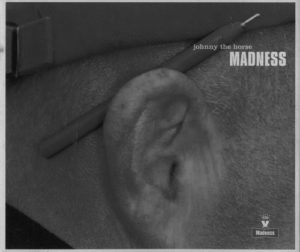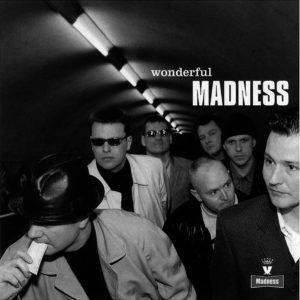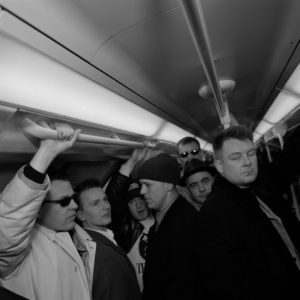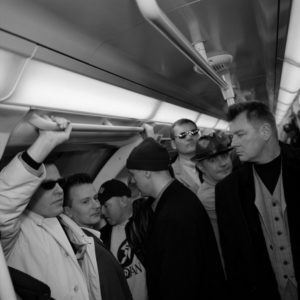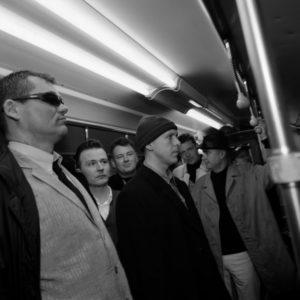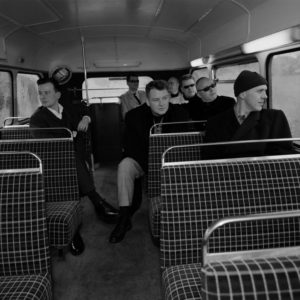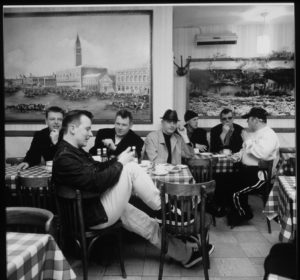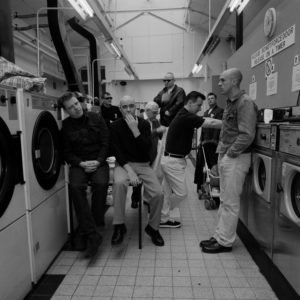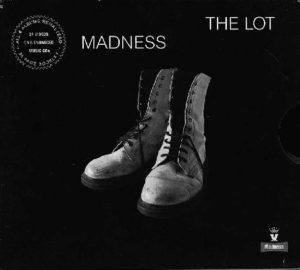
1999
The first new studio album for 15 years sees the unmistakable sound return… and finally breathes fresh life into the band.
SUGGS: It was getting a bit ridiculous. It was obvious we were going to keep doing this thing, whether it was every couple of years or every year.
LEE: We’d done the Christmas tours and all the old stuff, and I felt it was time to push the boat out a bit.
WOODY: We just needed something fresh and new that would inspire us and make us excited. People had come forward with songs before, but it had never seemed like the right time to record any of them. But now it seemed perfect, ‘cos it was our 20th anniversary.
SUGGS: We just felt we had the most material and the right feeling.
LEE: Everyone put pen to paper and started writing. I said, ‘Mike, put the tulips down, I’m coming over.’ Then I packed my pen and ink and went across to Amsterdam. We got to work straight away and came up with several songs.
CHRIS: Personally, I didn’t think it would come to anything. I already had a lot of songs I’d written with Lee that would have been good for Madness to record but I felt a great loyalty to Crunch! so I didn’t want to give them up.
Armed with a smattering of new tracks that they’ve been tinkering with in Suggs’s absence, the band start to plot a new album
SUGGS: The band had gone off and done some demos together without me and Mark, which really started the ball rolling.
CHRIS: It was suggested that we use our old Liquidator studio in Caledonian Road to demo some new songs. It ended up costing us a lot of money for some tracks that didn’t have Suggs singing on or Mark playing bass on. And the songs aren’t Madness without Suggs – it’d be like Oasis without Liam – so he came back and we redid them.
WOODY: It still took a long time to make sure that everyone was committed. It was coming together but there was one fundamental rule that we were constantly going back to: You need all seven members of the band, otherwise it won’t work. There were limbs missing.
SUGGS: One would get on, one would get off, one would say, ‘Yeah I’m really keen’ in the pub that night, then the next morning, ‘Oh bollocks, I don’t wanna do that.’ We’ve always had a certain kind of perversity. For every person in the band who desperately wanted to be successful there was someone who was dragging his feet in the canal and facing the other direction. We’d always worked on the premise that we all had to be enjoying it to be able to do it. And by that stage. we all felt like that.
WOODY: We’d done very well just getting together a couple of times a year; greatest hits, an easy life. But we needed that sense of paddling in the deep end so we came back to writing new songs. Saying that, we didn’t want to go back to that cycle of the music industry straight away, so we were a bit cautious.
CHRIS: I was very wary and negative, but I put everything into other people’s songs. That’s why it took some time to really start writing stuff.
SUGGS: We’ve all had our periods in the wilderness and mine came around this time, but then I got back right into it. My thoughts were, ‘We’ll do this album, reconnect with each other and then really get our act together with the next one.’
CARL: We knew that people were quite happy for us to play a few big shows of greatest hits every couple of years, but a full album of new material was a different story entirely.
MIKE: We waited 14 years to make it as we wanted to make it a really good one.
CARL: If we’d rushed into recording a bunch of new songs when we first got back together we’d probably have been slaughtered, and more than likely deserved it. I think we were right to hold off making the record until the time was right. There was no panic or pressure and we felt completely confident with the quality of the songs.
SUGGS: There’s a certain point where everyone’s slagging it off and there’s a lot of pressure from people who say you shouldn’t disturb the memory. Then after a while you ask, ‘Who owns this concept?’ It’s like a box somewhere on a dusty shelf somewhere, only to be looked at by the privileged and righteous. Well, it’s our box, to get down whenever we like and to do with whatever we want.
FEBRUARY: Suggs appears in Don’t Go Breaking My Heart
Read more
The frontman makes a cameo appearance in this romantic comedy, playing a singer called Rex. The flick also stars Jenny Seagrove, Anthony Edwards and Charles Dance.
FEBRUARY: Rehearsals begin in earnest
Read more
Madness start rehearsing the new album, with the help of musician pals Terry Edwards and Boz Boorer.
WOODY: We approached the first rehearsals very cautiously. We didn’t want to have a miserable time, we wanted to have a good time and we were very open to the fact that if it wasn’t going to work, then we hadn’t lost anything by attempting it. But it went surprisingly well and the songs really began to mould themselves into Madness songs. It was enjoyable and I personally got a buzz out of it.
SUGGS: The atmosphere was clear, there was no confusion and it was pretty straightforward. In those years off, I think we’d all grown up a bit. We all had to get together on an equal footing as grown-ups and not teenagers, which is what we’d been when we started.
TERRY EDWARDS (musician): Having played and recorded with Bedders, Chris and Lee, and socialised with most of the band, I’d become a reasonably natural choice to help out. By that point, I’d got a track record as an arranger, too, so it helped that I could get a horn section together and be the conduit between band, producers and other musicians. It was exciting to be working on some new Madness stuff.
BOZ BOORER (musician): I worked quite hard with Carl and Lee on the early demos. Carl asked me to give him a hand with some brass parts so I did a week with them, which was a lot of fun and I was made to feel welcome – it was like a little family and I was invited in.
TERRY EDWARDS: It was a positive experience all round; so many of the band write songs that they must have been gagging to get something out after such a long time.
CARL: I’d been concentrating on the album for so long – it was something I really thought about and really wanted to do.
BOZ BOORER: We’d been there for a couple of days without Mike but when he eventually turned up the sound really came together; it just emanated from his keyboard.
STEVE PRITCHARD (EMI-Virgin): Mike coming back from Holland really was the turning point. With him joining in, the gang was complete. It really was like the return of the magnificent seven, like a Western.
MIKE: During those first rehearsals we played our new songs to each other – songs that are occasionally brilliant – and Clive Langer made us realise that they could stand up to our best efforts from the past.
WOODY: We still worked together in exactly the same way. So there was no new weird and wonderful way of recording the album. We still went into the studio with Clive, presented our songs to him, then went through the elimination process.
APRIL: After a couple of months rehearsing, the band start recording Wonderful
WOODY: We didn’t have a perceived idea of what sound we wanted. People wrote songs and we played them – it was that simple. We are who we are: we are Madness and you can’t take Madness out of us.
SUGGS: Someone was in the studio when we started recording. And they were sitting there when Mike started playing, then Chris, then me, then Carl finishing it off and he said, ‘Oh fuck me – it sounds like Madness’. Because it is all the components; all the parts coming together.
BEDDERS: It’s a slippery thing to say, but who else could it be? When you get the seven of us playing together that’s what it sounds like and time didn’t seem to have changed that too much. It’s strange, because it’s not as if we didn’t listen to contemporary music – we all did and we all had very diverse tastes.
WOODY: The thing was, we weren’t fighting it any more. In the latter part of our career we were fighting against ourselves because we were fed up with being us. We were trying to expand our horizons and we didn’t want to be Madness particularly – we wanted to be better. This time round we just went in and we were who we were. There was no need to be any different because we suddenly realised that people over the years had bought our records. We thought, ‘They like us for who we are, so why change it?’
BEDDERS: I think that’s natural. When you make albums then obviously each one has to be different so you feel in a sense it’s progression. This time we felt like we’d just go back in there and play the songs, which is what we did when did the Madstocks. We were very relaxed about it.
SUGGS: Between us, we had a whole bunch of new stuff, so it was just a matter of getting Clive Langer to throw out the rubbish and pick tracks that everybody could play live and believe in. And that’s just what happened.
LEE: I didn’t particularly want to use Clive and Alan because I know how busy Clive is and how much he charges. I was thinking of Linton Kwesi Johnson and Devis Bovell, or maybe even Ian Dury. I thought that would have been a great combination but of course it didn’t happen. However, in the end Clive did a brilliant job – he pulled out all the stops.
SUGGS: Each of us imagines it coming out slightly different than it eventually does, but Clive and Alan are the only people who can manage seven separate concepts, with all of us playing a different song at the same time.
WOODY: They also know what we’re capable of, and the extent of our ability as musicians. They know there’s no point asking Chris to do a heavy metal guitar solo. Instead, they know how to get the best out of each of us.
SUGGS: Plus it helps that Clive has a vision and does great arrangements.
WOODY: There was a danger of trying to go down the modern line and bring in a load of dance beats and stuff, but Clive rejected all of that and wanted Madness to sound like Madness…
LEE: …he said he wanted that rawness of One Step Beyond. He wanted it to sound basic.
WOODY: Mostly, it was enjoyable. We just went in and bashed it out very, very quickly. I did all my tracks in a week – it was like back to the old days again. The thing was that we just wanted to go in there and put everything down as live as possible as quickly as possible. We just wanted to go in there and get a kind-of live feel. It would have sounded quite odd to hear a drum machine in these songs. It was more enjoyable, for me because it was less anal – it was just go in, put the kit up, put the mike on it and do it. It sounded like a Madness album.
BEDDERS: It starts with Woody and me – we’re really the two people who play together because you put the bass and drums down together, hopefully, and get a good take of the two and obviously patch bits and pieces up. It really is more like a live performance.
CARL: We’ll also have a guide vocal to help us.
WOODY: We’ll add the keyboards in, bit of guitar, bit of sax, whoever’s around at the time, because you need that to give it a bit of flavour.
BEDDERS: We’ve never really written the songs in the studio. We’ve always been quite disciplined and always had the songs more or less ready, and rehearsed them exactly how we were going to record them.
SUGGS: It’s like an East German football team the way we rehearse and record.
CARL: We like to go into rehearsal and get Clive in, who’s reputedly the eighth member of the band, and go round the songs, rearrange them, if he thinks something lacks something then we go off and rewrite, so it’s all prepared, we know what we’re doing, so that we can enjoy it really.
WOODY: And then Clive changes his mind.
CARL: Whoever writes the song, writes the song: verse, verse, chorus, middle-eight. And then Clive comes and goes, ‘No no we’ll have that there and da da da’. And that’s generally his role. He’s a musician as well as being a producer, which is helpful.
WOODY: We did it in a way that was just like how we recorded in 1986. So we didn’t move on – we were still stuck in the old way of recording where you go to a studio, you grind away, do loads of overdubs, and people go in separately so it’s not very collective as a band. So actually it was somewhat of a struggle by the end.
APRIL 28: Madness fly to America
Read more
The album is all but completed by the time the band fly to the States to promote the release of their in-concert album, Univeral Madness. A three-date East Coast tour plays thousand-capacity venues in New York, Washington and Philadelphia.
SUGGS (speaking in 1999): The success is being in the studio and writing great songs, and the success is me being here right now, and the success is whatever is on that day. Whatever it is on the following day is irrelevant, because it hasn’t happened. Tomorrow is a mystery, yesterday was history, but today is a gift and that’s way we call it… the present!
APRIL 29: Appear on the David Letterman Show, performing Our House and an impromptu One Step Beyond.
watch the performance
CHRIS: Doing that show was a right laugh – although David Letterman himself was a bit of a miserable geezer.
APRIL 30: Irving Plaza, New York
SUGGS (speaking in 1999): Here we are, 20 years after we started, and the Americans have finally got it. But this ska revival has an uptempo, punky vibe – when we came to California last year, I thought, ‘We’re gonna sound like the fucking Glenn Miller band’. Doesn’t matter. I’m finally enjoying every minute. Now there’s no desperate plan, and no weight of responsibility.
MAY 30: Washington DC
MAY 2: Electric Factory, Philadelphia
Read more
Madness are supported by The Pilfers for tonight’s show. While in Philadelphia, they record Our House at Sonic Recording Studios for WPLY 100.3 FM. It later appears on the radio station’s Sonic Sessions Volume 3 CD, along with artists including Hole, The Black Crowes and Alanis Morisette.
BEDDERS (speaking in 1999): We all feel better and that’s why it’s better. And that’s where it stems from.
WOODY (speaking in 1999): It’s a lot more relaxed.
BEDDERS (speaking in 1999): We’re relishing it a lot more and we want to keep it going.
SUGGS (speaking in 1999): I was really pleased when we came back that we were taken so seriously. I remember a period when it was considered immature to like Madness. But we were seven individuals who somehow managed to produce this one thing. And you do all this work, pile it on and on, and a few years later people can see that, though it was understated it was something. All these big explosions of pomp were going on around you while you’re in the trenches. And when the dust settles, you find out you’ve won.
LEE (speaking in 1999): Really, we’re honest, wholesome, good-for-nothing chancers.
SUGGS (speaking in 1999): Madness have always been about accentuating the positive. It’s no accident our songs are still enjoyed 30 years down the line. They’re upbeat, timeless – a clear-eyed celebration of life.
MAY 4: Appear on Late Night With Conan O’Brien
CARL (speaking in 1999): We appreciate that the record company is behind us. They’re happy we’ve done a great album and we’re happy we’ve done a great album.
SUGGS (speaking in 1999): We’re just a diamond waiting to be buffed… a rough diamond.
MAY: Lee and Mike play a one-off gig as Mr Wheeze at the Old Bull, High Barnet
LEE: We split up shortly after midnight, after doing just one solitary performance.
JUNE 23: Camden Lock, London
Read more
Initially intended as an invite-only show, some 200 people flock to the location after a local TV report leaks the news. With Lee dressed as a one-eyed captain, the band arrive by boat before performing a short set.
STEVE PRITCHARD: They were back to being a band then, with lots of opinions and directions. We really wanted it to work.
SUGGS: We were lucky because there was a new freedom to do what you liked, when you liked. In our earlier incarnation, it was all about single-single-single-album-tour every single year. But things had changed by the time we reformed properly – suddenly the pressure was off and we could do what we wanted to do, at our own pace.
The gig backdrop shows the new Madness logo, which features the huge ‘M’ now wearing a crown.
CHRIS: I could never stand the original naff pork pie hat drawing but I understand why so many people love it and have tattoos etc. But we had to get shot of it and move on. I know everyone loves it but there you go. That’s showbusiness.
JULY 2: Appear on TFI Friday
Read more
Madness perform on the anarchic Channel 4 show. During Night Boat To Cairo they are joined by The Massive Heeds – four men wearing giant fibreglass heads modelled on the members of U2 – who recreate the Nutty Train and other signature Madness dance moves. Other guests include Elvis Costello, Emma Bunton and The Goo Goo Dolls.
JULY 4: Party In The Park, London
Read more
Madness appear in front of 100,000 people as part of the fund-raising extravaganza for the Prince’s Trust. Other artists appearing include Blondie, Elvis Costello, Culture Club, Roxette, Texas and UB40. Norman Watt-Roy stands in for Bedders as the band playback four songs, including Lovestruck.
CARL (speaking in 1999): We never had any real plans to write together again, but the reaction to the live shows here and in America was so good it seemed daft for us to just do all the old favourites. We’ve been lucky in that the group has never quite disappeared from the public eye. Every now and again there’s been a concert, a compilation album, or new groups giving us a plug! But there’s nothing to beat being back in business for real.
SUGGS (speaking in 1999): We’ve been talking about doing new material since ‘94. The reason is that we didn’t want to fudge it. It had to be proper Madness. What turned it round was touring the States last year on the back of the ska revival. We’d never toured the US. We played to crowds who didn’t know us. When they lapped it up, we realised we had something new to offer.
CARL (speaking in 1999): Since we’ve been playing together again, we’ve written a few new songs, but not that many, to put in the set because it was beginning to get a bit tiresome just playing our old material. There seemed to be a bit a flurry of writing last year and everybody felt confident that what had been written was strong enough to stand up to what we’d done in the past really, so that sort of pushed us into making an album.
SUGGS (speaking in 1999): We waited for quite a long time for all this to come together. I mean some if us have been pushing for it more than others, but all in all, I think in the back of all our minds, we’d do it again and now was exactly the right time. We never kind of split up officially, we just kind of fizzled out, and if it hadn’t been for the fact that it was 14 years, then we could say it was just a pause. But you know, we don’t. I mean, we’ve been offered things like ’80s revival tours, but we’re not really interested in reviving the ’80s, you know we’re interested in making a great new album, which is what we have done.
JULY 19: New single Lovestruck is released
Read more
The band’s first studio release for 13 years is a track by Lee and Mike, written about the perils of drinking. The band had been pushing for another new track – Johnny The Horse – being the first single, but are overruled. Virgin’s insistence that Lovestruck is the first single pays off as the song pushes Madness into the Top 10 for the first time since 1983. The single spends nine weeks in the charts, peaking at No10.
MICK GARBUTT (Virgin radio plugger): We all insisted on Lovestruck as the first single – it was an obvious hit.
LEE: It was one of the first pieces of new material we started writing and one of the songs Mike and I wrote together in Amsterdam. From the opening piano notes ‘tum-ti-tum-ti-tum-ti’ etc, I knew it was going to be an enjoyable session. Its working title was Falling For A Lamp-Post, a song of love lost through the bottle and your only friend is a lamp-post and the best hangover cure is another.
SUGGS: It’s about being so drunk one falls in love with a lamp-post. I’ve certainly done that and I’m sure most people will identify with the lyrics.
BEDDERS: Lyrically, it’s fantastic, and conjures up some wonderful imagery – that confusion of being drunk and staggering around, with a bit of hopelessness and bravado thrown in. I can just imagine Lee in that situation; being really drunk and trying to get home, bouncing from lamp-post to lamp-post. It’s also got one of the best openings to any Madness song.
LEE: As well the lamp-post stuff, it was also about stepping back and looking at what I’d been doing after the band split and how close I came to losing my house, my family and everything else because of my drinking. It made me realise that it really had been touch and go.
SUGGS: It’s certainly one of my favourite songs. It’s been compared with The Sun And The Rain, which is fair. It’s the same speed with the same air of melancholy.
CARL: It was the first video we’d made in absolutely years, so it was nice to come back together again. It was shot in King’s Cross and I actually took my corset off for it; I didn’t mind showing off my fat tummy.
CHRIS: Everyone had loads of ideas for it. Because it was about drinking, Woody and Mike were meant to represent good and evil.
WOODY: Normally I hate doing videos because there’s so much hanging around, but I laughed all day doing that one.
LEE: That’s cos you were pissed out of your head!
MIKE: It’s a good video but I didn’t like all the bits in the park.
CARL: Oh I dunno, I liked dressing up as hippies – the only thing was, no one was handing out any spliff.
MIKE: Also, they didn’t want us to have any alcohol on set and yet the song was all about the bloody stuff!
JULY 23: Appear on Top of the Pops with Lovestruck
Read more
Jayne Middlemiss introduces the band, who appear on the show along with popular 90s acts Steps, The Cardigans and Catatonia.
watch the performance
JULY 24: BRMB Cash For Kids, Birmingham
Read more
The band appear at the radio station’s charity concert at Cannon Hill Park, with locals UB40 headlining. A 35,000-strong crowd watches the event, which is broadcast live.
SUGGS (speaking in 1999): People are always asking, ‘Are you doing it for the money or for artistic reasons?’ or whatever, and that’s exactly why you’re doing it, both those reasons, you’re getting some artistic expression and at the same time you’re getting some money. It’s like Van Morrison, a very artistic and creative guy. He says he looks at it like it’s someone painting a house, if he writes a song. I think there’s an element of that in the band, we’re not too pretentious about it all.
CHRIS (speaking in 1999): One of the reasons that we have reformed is because we all get on OK. There are a few little tear-ups now and then but that is understandable at our age. A lot of other bands split up because they detested each other and still do.
WOODY (speaking in 1999): I think we’re a lot more relaxed as musicians, we know our instruments better, Suggs knows his vocal chords better. I think we’ve just grown up. Hopefully we haven’t become boring old farts.
LEE (speaking in 1999): For better or for worse, we’re not as naïve as we were back then. And I think that is for better and for worse. When we started, I don’t think we knew what we were after. We just went into a room and bashed and banged and blew things and just had a marvellous time.
SUGGS (speaking in 1999): It doesn’t enter into my frame of reference, all that stuff about blemishing and thinking of being in boxes and bubbles. I just think I’ve grown up so much, that it’s just, ‘I’m alive’, you know what I mean? And there was that Dennis Potter thing wasn’t there: I can’t tell you how great this cigarette is to smoke and how blossomy the tree is, all the blossom, that’s how I feel. Everything is what it should be and could be and I’m not interested in comparing it to the past and to the future or whatever.”
MIKE (speaking in 1999): We have tried it at various times before, but it just hasn’t happened. People have gone through various things, and when we get together, the work that we create is good.
WOODY (speaking in 1999): It’s a long time and we’ve been doing the same stuff and new material is the only way forward. We’re gonna do videos and we’re gonna do gigs but we’re gonna be more selective. We’ve got lives.
BEDDERS (speaking in 1999): I’m kind of confident in, I think in what I’m doing in the rest of my life, so I think it’s quite easy to go and actually now do this and play some music and enjoy it and relish it a bit.
JULY 25: Pepsi Sziget Festival, Budapest
Read more
Madness fly out to Hungary’s capital to participate in the week-long festival on an island on the Danube, which attracts around 300,000 people.
CARL (speaking in 1999): It’s brilliant to be back together again. Madness work against the sort of grain. It may not look like that, but we do. If it works for us on an honest level then we do it.
SUGGS (speaking in 1999): The best thing about being in Madness is that you just sort of hide, be irresponsible, in a world that is so overwhelmed by people being responsible. Sometimes it is better to jump out of a car at the wrong time and runaway and go and sit in a pub on a sunny afternoon than it is to go and do what you’re supposed to be doing and that’s a great luxury of being in a band.
JULY 30: Appear on Top of the Pops with Lovestruck
Read more
Madness appear on the show for the second week running, this time with Lee dressed as the tequila-loving worm from the video.
watch the performance
AUGUST: Carl’s record collection goes missing
CARL: I put all my singles in storage and had a management company for a while, so I put them as my address. I paid a year, and then I paid a half year, and thought, ‘They’ll get back to me when they want paying.’ Next thing, my agent rang and said someone was auctioning a load of stuff. They’d approached my old office and I hadn’t left a forwarding address, so everything I’d ever collected, all my original singles, had gone, along with loads of family pictures and gold discs. I was annoyed as I didn’t want to go around buying what’s mine, but I also felt quite stoic about it. I thought, ‘What’s important? The band are working again, it’s great, we’re making a great album, I’ve got the wife and kids, my memory is in my head, so to let go, it’s quite good in a way.’ It’s a real shame, but what can you do? Sometimes I think I must have done something wrong for it to have happened, but I just didn’t give the right address. But the thing is, if you spend your life saying, ‘What does it matter if your ship goes down with all your goods, and you are alive on the shore?’ You say things like that then have you have to live by it.
AUGUST 20: Suggs sings It Must Be Love at the wedding of TV presenter Zoe Ball and DJ Norman Cook.
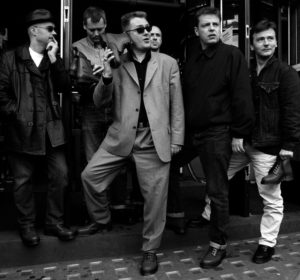
SEPTEMBER 30: Electric Ballroom, Camden
Read more
Billed as ‘A Slice Of Madness’, the band play a show in aid of The Big Issue and homeless charity Shelter. The event is sponsored by Dr Martens, who also produce a special limited edition 1460 boot in the band’s honour. Earlier in the day, the band appear at the Dr Martens store in Covent Garden to help launch the boot, which is embossed with the ‘M’ logo. Also as part of the celebrations, Bedders designs the artwork for a double-CD compilation – Forty: Forty (The Dr Martens Box Set) – that is issued by Virgin in July 2000. Madness are represented by Shut Up.
OCTOBER 2: BBC radio
Read more
Madness perform Ian Dury’s My Old Man as a tribute to their hero, one of two songs on BBC radio as part of a week of events at Sheffield’s National Centre For Popular Music.
SUGGS (speaking in 1999): In any group of people, everyone’s got their idiosyncrasies. It can be difficult to spend this much time together, and obviously, we all have our ups and downs, but on the whole…
CARL (speaking in 1999): … yeah, it’s pretty nice being in Madness. A lot of people are pretty gobsmacked that we’re still together and still get on pretty well.
OCTOBER 23: Carl and Lee come to blows
Read more
Madness play a show for Virgin Radio in the old Battersea Power Station. In the pub afterwards, a row between Carl and Lee escalates from insults into a fully-fledged fist fight. Lee can be seen nursing a black eye in the video for Johnny The Horse, which is filmed the next day. Afterwards, he often travels to gigs separately.
MICK GARBUTT: Lee and Carl had a fractious relationship that ended up with them having a fight. I think there was some underlying feeling that Carl, who was now ‘Mr Record Company’, was taking over. He was the prime mover and really wanted some professionalism.
LEE: There’s a sort of grey area, no one knows what actually happened because there was alcohol involved but it got a bit physical, yeah. Me and him in the toilet.
CHRIS: Thommo came off worst, but you would with Carl.
LEE: Things were never the same afterwards.
PETER RUDGE (Madness manager): All of them tolerated Carl, but for me, he was a nightmare. I found my relationship with him to be the most unpleasant I’ve had with any artist I’ve managed. In a way, he was harmless but he could be physically intimidating.
LOUIS VAUSE (Crunch! keyboardist): I remember being in the studio once, talking about Lee, and suddenly Carl’s face went very cold. He looked at me and it was frightening. I had to say, ‘Carl, this is Louis here!’ He just replied, ‘Lee’s been winding me up for 20 years.’
MICK GARBUTT: I’m wondering if the resentment between Lee and Carl came from the early days because Carl wasn’t originally a full-time member.
SUGGS: We got pissed off with each other all the time and the odd blow was thrown, but not many, considering. Although I do remember Chris and Lee nearly killing each other once.
CHRIS: We were in France and there had been a lot of excessive drinking before we went on, so I was in a bit of a narky mood. Lee just started totally mucking around, banging the microphone on the floor. The sound guy came out and tried to swap out, so Lee pretended to hit him, and I just went for him. I thought, ‘I’m gonna kill him.’ We both exited stage right, had a big row and then back on and did the gig.
LEE: Chris attacked me with two bottles. If it had been Jack Daniels, I wouldn’t have minded, but he’s come at me with two Perrier bottles. I thought: ‘Chris, what you going to do with those?’ Then we ended up hugging a couple of hours later. As you do.
SUGGS: Me and Mike also had a fight after a gig in Manchester because he turned the van over. I mean, what sort of idiot does that?
WOODY: Madness is like an extended family, so we do love each other, but we also get on each other’s nerves. It’s not like you don’t love each other – you just need a break sometimes.
SUGGS: We hit each other on the nose in the wee small hours occasionally, and there’s late-night mad things that go on – standing outside a hotel after we’ve done a gig in Belgium or somewhere. That’s how we get our therapy – going absolutely barmy at each other, with each other, for each other and against other people. It’s when you’re really pissed that you get down to saying, ‘What REALLY annoyed me…’ It’s like any problem, isn’t it? When it comes out in the open it’s daylight.
JOHN WYNNE (Madness sound engineer): I remember once there was a row and Carl said something to Woody and Bedders about, ‘Oh, you’re just a pair of middle-class grammar school boys’, having a poke at that, in the belief that they were all street-cred working class.
SUGGS: Mike slapped me round the face with a rubber chicken once too. I did the whole gig apoplectic with rage with the shame of these red welts across my face. Chris jumped on his back and we nearly had him, but he’s a very big man, Mike. He was throwing us off like flies.
LEE: The thing is, we used to have this roadie who did the pyrotechnics and he’d mark the stage with gaffer tape where the keyboards would be. Somehow there was a mix-up and they were right on top of the pyrotechnics. One… Step… Beyond… boom! Mike came into the dressing room, ‘You f*ckers, you’re trying to kill me!’ and, yeah, a rubber chicken was thrown across the stage.
SUGGS: Bedders also hit me in the eye with his bass once – I’ve still got the scar. He said it wasn’t on purpose but you never know. The only saving grace was that it was the thin end.
CHRIS: We all argue and bitch with each other, some more than others. The main sort of bitching people are me and Carl, me and Barso or Barso and Carl – any kind of combinations of us three. Woody’s kind of really sensible, he’s become the elder statesman of the band in some ways, he’s really funny. Bedders just stays out of it, Suggs stays out of it, and then Lee does these weird little e-mails that no one understands.
SUGGS: The main factor is, we’ve been friends, some of us, since we were 12, so there’s a great communication between us all. That doesn’t mean we don’t fight horribly – because we do. But there’s a lot of flexibility, allowing people to be what they want to be, and do what they want.
PETER RUDGE: The infighting was quite dramatic but in the end they always circled the wagons and moved on as seven. It was almost tribal in the way that they dealt with life. I’d never seen that kind thing before.
CARL: All the dark stuff is never seen. It’s alluded to, but it’s never spoken of.
STEVE PRITCHARD: The band were all genuine people and were always nice to work with. But the main problem was there were seven strong characters with strong opinions about everything. They were all so individual and had all got their own world views which rarely fell in the same place at the same time. So there were big arguments.
JOHN WYNNE: If they hadn’t been in Madness, there’s a good chance that a few of them would have been on Her Majesty’s pleasure. Lee would have definitely been there. Suggs and Carl too, maybe. The others were more sensible.
OCTOBER 30: Appear on Later With... Jools Holland
Read more
Madness perform live versions of Lovestruck, Johnny The Horse and Our House, with Ian Dury joining the band for Drip Fed Fred. Other acts in the studio include Tori Amos and Pavement.
watch drip fed fred
NOVEMBER 1: New single Johnny the Horse is released
Read more
For the second single from the new album, Virgin are concerned about the opening line: ‘Johnny the horse was kicked to death / He died for entertainment.’ Afraid it might alienate radio stations, an alternate version is created for the airwaves, amended to: ‘Johnny the Horse, he passed this way…’ Despite the catchy chorus, the single stalls just outside the Top 40.
CARL: It’s a true story – sort of – about the generic term for down-and-outs with nicknames. The idea for it came from an incident I had with two old guys who used to hang around near where I lived when the band were starting off. One was an Irish ex-boxer called Dempsey who was a gentle giant and a little punch drunk; the other was Scottish and very quiet. They’d become a fixture for years, sitting on a park wall outside the old fire station drinking their bottles of VP Ruby Red. They were very pleasant and I’d stop and chat with them and they’d offer me the drink, which I’d turn down. One day when I passed, I saw Dempsey on his own in a state of distress; he was crying his eyes out, full of grief. He told me his Scottish friend had slept in a derelict house and had been kicked to death by a gang of lads for a laugh. I remembered the story and was later moved to write about how there are so many who disappear onto the streets, forgotten or ignored. I also expanded it a bit to take in how we all have the potential to be great, but life can take you down weird roads. It’s where the line, ‘Johnny The Horse was kicked to death / He died for entertainment’ came from. I’d also read another about this guy who was taken into casualty by a policewoman and checked himself out and died on a bench. So it was that sort of thing, about the sort of people who aren’t really missed by society, like down-and-outs who’ve had a life but you never know exactly what it is.
MIKE: The video was cooking at the beginning, but they ran out of time and money by the end of it.
CARL: Yeah, I wasn’t sure about this one too.
CHRIS: We turned up at about 8am but they didn’t film us until 6pm because the director did commercials, so they had very high standards of lighting and so on. Everything took hours.
CARL: And again, in the pub scenes, they didn’t want us to have any actual alcohol in the glasses, which was a bit naff.
MICK GARBUTT: It was B-listed for radio play but it just wasn’t going to happen. There was no doubt it was a fantastic track, though. It was Carl’s pride and joy.
BEDDERS: We had a lot of trouble getting our new records played on the radio. I think the radio station people found it hard to fit us into their neat little playlists and Johnny the Horse suffered badly from this. Was it in the style of an old Madness song? Was it a new direction? That was the dilemma.
CARL: I don’t know why it wasn’t a big hit but quite frankly it doesn’t concern me. The moment has passed
Carl’s tribute to his dad – You're Wonderful – appears on the B-side of one of the CD versions of Johnny The Horse, instead of on the upcoming album.
CARL: Clive felt it was too similar in tempo to The Wizard and Johnny The Horse to go on the album. When I found out, I offered to take off two of my other tracks just to have it included, but no one in the band supported me. I thought it was worthy of inclusion but there you go; Madness is a democracy to a large extent and you either have to live with that or go on holiday.
CHRIS: It’s a long story. For some reason it became a choice between You’re Wonderful and another good song, Round and Round. I liked them both and said both should be on the album, giving us 13 tracks. There was then some sort of kerfuffle and neither of them made it – it was a decision made by the band, record company and producer. I thought if the quality was there we should let it shine out, but my feeble voice got rather lost in all the testosterone. As usual, it was all a bit wishy-washy and hard to get a definitive answer.
CARL: I was very upset that it ended up buried on a B-side. When I’d played it at Madstock, it amazed me when after the first chorus everyone got the words and was singing along. It was fantastic.
CHRIS: To be honest, by the time we came to make the album, the whole selection process was becoming a bit like survival of the fittest. It was quite nasty at times and Clive nearly quit. I didn’t even bother. We had more than enough songs, although I think some good ones got trampled over in the rush.
SUGGS: There was some argy-bargy about how many tracks should be on it and what to leave off.
MIKE: It was like elks squaring up and banging their antlers.
CHRIS: There were plenty of good songs, but it was a bit of a selfish atmosphere. Mike and Carl were sometimes pushing too hard for their songs to be on the album instead of thinking about the overall picture.
WOODY: It’s ironic that what eventually became Wonderful wasn’t all wonderful because some of those battles for supremacy re-emerged.
SUGGS: All seven of us had different ideas what it should be called. Ordinary Magic was mine, Excuse Us was another.
CHRIS: Suggs had suggested Excuse Us which I preferred, but of course there was the usual procrastination.
WOODY: Nice One was another one, but I thought that was a bit cheesy.
CHRIS: Wonderful was Carl’s idea as he’d written the song of the same name.
LEE: I’d wanted to call it You’re Wonderful, but that was a bit patronising, so we just dropped the first bit.
SUGGS: In the great tradition of Madness, it was left to the last minute, after lots of arguing.
WOODY: In the end, we were so tired of it, we just went, ‘Okay, fine, Wonderful it is.’
CHRIS: Incidentally Adam and The Ants had also released an album called Wonderful, so it must’ve been a popular name for an album. David Essex too, but I think that was after us.
NOVEMBER 1: The Wonderful album is released
Read more
Released on the same day as Johnny The Horse, the band’s first new material in 14 years is well received by the critics, and the album itself goes on to peak at No17. The title is Chris’s idea of a compromise in the absence of You’re Wonderful; Carl had actually preferred the name Nice One. Bedders designs the sleeve.
TRACK-BY-TRACK: Click on song title
1. Lovestruck
SUGGS: I always thought this song was great. Right the very start, at rehearsals, I thought, ‘That’s a single.’ Mike’s keyboards, the lyrics and the chorus just had the elements of a classic Madness song. I still hear it on the radio and think, ‘Why wasn’t that a bigger hit?’
MIKE: The words are brilliant – Lee really does write some fantastic lyrics.
SUGGS: Lee, I can genuinely say, is one of the great – I wouldn’t say lyricists – writers of words for pop music. He does inhabit a very particular world. They’re his lyrics, but I can inhabit them. I edit them sometimes for the better, sometimes for the worse, to make me feel like I understand more about what he’s trying to say. In this particular case, I didn’t edit any of Lee’s words but I moved some of the lines around to make me understand a bit more because often what he writes about is very dark.
2. Johnny The Horse
CARL: I talked to one dosser outside the Cube Bar in Swiss Cottage and he used to work for someone like the Saatchis, he was in advertising and now he’s sitting there begging. It’s funny how people’s lives can unravel, so that’s what it’s about. They’ve had a life and then sort of fall between the cracks. And who remembers them?
3. The Communicator
WOODY: Carl had tried it with a couple of other musicians before Madness got their hands on it, and I drummed on it. I think he was stuck in a rut of a certain type of music, and I tried to get him to go down the ska line as he’s so good at writing that kind of stuff. It kind of stemmed from, ‘Don’t be scared of what you’re best at.’ So we did it as this uptempo track and it came through. It proved there was no need to shy away from who we are and what we do well.
LEE: I think Carl saw it as a present-day One Step Beyond: ‘Hey you! I’m the Communicator.’
WOODY: People had been urging us to do a ska album, which we didn’t want to do, but there’s definitely a place for this one on the album. There would have been a big hole without it.
4. 4AM
SUGGS: Mike had a few ideas for words and I started changing them and it just developed. There wasn’t any real plan or story, it just seemed to come out that way. It’s just two people who have split up and they’re waiting for the other to phone up, but both of them are too proud to make the first step. Accidentally the names are Terry and Julie, the same as Waterloo Sunset.
5. The Wizard
SUGGS: This one’s about how things do happen when you start to think about them, and how you can create atmospheres from your own behaviour. Without being some sort of pagan, there is magic in the air.
LEE: Carl was talking about how, if it was ever a single, the video would be really ‘out there’…
SUGGS: …he and I were going to be stuck back to back; he was good and I was evil.
LOUIS VAUSE: I went to Carl’s office one day and said, ‘Why don’t you send The Wizard to the Harry Potter film producers?’ He got straight on the phone but we were too late. It would have been ideal for the end credits.
CARL: Having read all the Potter books – after my son had read ’em first – and being interested in things of an esoteric nature, I thought it might be cool to get it included in the film. As the dude who wrote it, I would have been very happy and duly crossed my fingers, but nothing happened.
6. Drip Fed Fred
WOODY: Lee said he had this image of a character called Freddy, who got up to all sorts of criminal antics, along with this great long storyline and various characters.
LEE: I’d been on Mike’s barge, writing this tongue-in-cheek song about a gangster. He came up with a tune and I came up with the lyrics.
MIKE: We had this little tune and I went to have dinner and said, ‘Listen to it on the headphones and see what you come up with. I’ll come back and see what you’ve done in a minute.’ I came back after my dinner and it was all there; all these different parts broken down – ‘Choir here’ – this happening, that happening. There was such a variety and a humour to it. It was brilliant.
LEE: It was written in a couple of hours from start to finish. We were giggling as we were writing it, because as other boats went by the houseboat would rock. But we still finished the whole demo in an afternoon – we were definitely on a roll.
BEDDERS: I think Lee always had Ian Dury in mind for it.
WOODY: He said he wanted various voices for the characters and that he could just hear Ian doing one of them.
SUGGS: He definitely wrote it with his voice in mind – plus it’s a very Ian-esque title too.
MIKE: By coincidence, while Lee was over in Amsterdam writing with me, Ian just happened to turn up in the same hotel.
CHRIS: Lee saw Ian in the bar and thought it would be great to have him on the song.
LEE: I cycled back from Mike’s to the hotel through the Vondelpark and when I entered reception, I noticed media bods and brightly-lit umbrellas flashing. Curiously I popped my head above the crowd and there, in a comfy chair, holding court, growling on about drug laws and wars and sexual freedom and liberalism, was Uncle Ian. He had to focus, then with a shocked second look shouted, ‘What the fuck are you doing here?’ I said, ‘I’ve come to stalk ya.’ We went downstairs and I said, ‘We’ve got this song and it’ll be right up your strasse.’ We met, I told him the story behind it and he said, ‘I love the sound of it, let’s meet back in England. What’s it called?’ When I told him he said, ‘Are you taking the piss?’ cos he was on this revolutionary drug and had to carry this bottle around with him. I told him about the song and he asked me to come round to his house to play it when we got back. We next met at the man’s house in NW3. Basically, he needed a copy of the lyrics and arrangement so that when he went into the studio there was no ‘fucking around’. Barso supplied a version he had recorded earlier for him to get the gist of, which I actually gave to Ian in Holland. Westside Studios was booked for an 11am start and there was me and Woody with Clive and Alan, having a cup of tea and ready to rock out. Ian just came in, did vocal tracks within the hour and was whisked off to another engagement. When you’re in the business of life, you don’t have too much time to hang around. We ended up using most of the first take and bits of the second. Bang, bang, bang. In and out, a trooper. He was that quick, the rest of the band was still in bed by the time he finished.
SUGGS: Unfortunately, I turned up to the studio late and because his time was precious as he was so ill, he’d already done his vocal and gone, so I never got to work with him as such. I just remember we were nervous about meeting him because he was uncompromisingly abrasive. You could call him a genius, and that’s one of the side effects of being a genius; fuck everybody else if they don’t realise.
CHRIS: It was brilliant, because he’d been such an influence on us. But it was sad, too, because he was obviously so ill.
CARL: It was kind of completing the cycle – we started off looking up to Ian and following his band. And we sorted of ended with this tribute to him.
TERRY EDWARDS: I’m particularly proud of being on a record with Ian as we’re from the same part of Essex, and Blockheads saxophonist Davey Payne inspired me to take up the instrument. The arrangement I wrote included the quote from the Ian Dury tune Razzle In My Pocket, which I slipped in as an homage.
LEE: Meeting and working with Ian was without doubt my golden moment. It was just phenomenal – like it was meant to be.
CARL: I just love the lyrics; Lee did such a brilliant job. I always think it’s quintessentially Madness and one of the perfect Madness songs. It expresses our love of London, our love of language, the Nutty Sound… it’s got all the elements.
BEDDERS: It’s a brilliant piece of work, with a brilliant chorus by Mike and characters who really suck you in. It’s a lyric that throws you into a group of people who are slightly dodgy but trying to work out some hierarchy between themselves. Although you never know with Lee – is it a bit of an allegory for the band itself?
WOODY: It went down really well in America before the album was even out. We played it in Philly, Boston and New York, and by the time we came to the end of out little East Coast stint, people were actually coming along with banners saying, ‘We want Freddy for our leader.’
7. Going to the Top
8. Elysium
WOODY: Lee and I wrote this one after he picked up on a little bit of music that I wrote at home. People really seemed to like it.
LEE: It’s a song about a free spirit going out of its mind in a world that does teeter.
CARL: I’m not being funny, but some of the lyrics disturb me.
CHRIS: A lot of people wanted to release it as the second single, but it ended up being Johnny the Horse.
SUGGS: I like it, from an outside perspective. It’s very straightforward pop with a fantastic melody, an enigmatic lyric and a bit of mystery.
9. Saturday Night Sunday Morning
SUGGS: There was an idea that it was about the return of the band but it wasn’t about anything specifically, it was about feelings. A lot of people I know meet on a Friday night in the same places and tend to talk about the same things and sometimes it’s fun and sometimes it’s a bit boring. And I suppose, coincidentally, it did relate to the fact that we started 20 years ago and that people are always comparing what we are now to then, but I didn’t really intend that when I wrote it. It was supposed to be that things aren’t the same as when you’re a teenager, you know, but it doesn’t mean they’re worse. Just things change and you don’t have to be scared of things changing. I was writing it more about myself and my friends, but I suppose there was a bit of the band in there too.
10. If I Didn't Care
11. No Money
WOODY: Nick had written this wonderful piece of music that I helped to rearrange and add a few bits here and there. We then sent it to Lee, who loved it, and we came up with No Money, which is terrible English.
NICK WOODGATE (Woody’s brother): Woody’s home studio was up and running, so I went round to record some of my ideas with him. We put down about four of my songs without lyrics and needed another one. We were a bit pushed so I just grabbed the keyboards and did the verse and chorus in about 10 seconds. We were then looking for a way of getting back from the chorus to the verse so Woody put in the chord ‘F’ and it worked perfectly. We still needed a middle eight, so again I banged out some chords and in about two minutes we had a song, which we called Joint. Woody then added it to the rest of his songs and sent them out to Madness. Lee picked up on it and deftly put some melody and lyrics to it, making it a finished song. In the summer of 1997, Madness went to their studios in Caledonian Road to record demos of the songs they wanted for the album. I didn’t know if No Money would make it but luckily Clive Langer liked it. I was there when they recorded it at Westside Studios in Shepherds Bush and was really excited – especially because Chelsea were on TV at the same time and scored a goal.
review
As one of Britain’s most consistent singles bands ever (in a six-year period between 1979 and 1985 their first 20 releases made the Top 20; spookily enough their twenty-first stalled at No21), Madness were frequently under-rated by ‘serious’ critics on the rather patronising grounds that they seemed to be enjoying themselves a bit too much and therefore couldn’t be regarded as heavyweight contenders. Their beginnings as a ska outfit were still being held against them in 1985, which belied the dark, brooding pop of the like of Michael Caine and Yesterday’s Men. Now, two decades after they first emerged, the magnificent seven are back with an album of all-new material. Thankfully, the collective’s absence from the touring treadmill means that they’ve approached this with all creative batteries recharged and their impeccable Pop sensibilities bright-eyed and bushy-tailed. The opening Lovestruck is vintage Madness, a moody verse dominated by Chris Foreman’s Barryesque guitar lines giving way to an exultant chorus whose key line (‘Lovestruck, I’ve fallen for a lamp-post’) conjures up the image of Suggs as a Cockney Gene Kelly skipping and singing through the rainy streets of Camden Town. That’s followed by the current single, Cathal Smyth’s Johnny The Horse, which is where Madness’ great gift for slipping cyanide into the cider becomes truly apparent. Casually heard this seems like a jolly, upbeat romp with a chorus made for an up-for-it mob until closer inspection reveals a tale of someone who’s slipped through all of society’s safety nets and meets a tragic and undignified end; somehow the line ‘Johnny The Horse was kicked to death / He died for entertainment’ doesn’t exactly lend itself to communal celebration. The Communicator acknowledges the band’s ska roots and there’s a further nod to their formative influences in Drip Fed Fred, where the debt to the multi-styled pre-Punk music hall mavericks Kilburn & The High Roads is paid in full by inviting Ian Dury aboard for a guest vocal. So then, Madness haven’t panicked and frantically attempted to embrace recent musical styles, preferring merely (merely!) to stick to their instincts and produce an album which is infectious, introspective and frequently inspired. As Saturday Night, Sunday Morning says: ‘Like thieves returning to the scene of the crime/ I knew we’d come back/ We always do’. Maybe so, but few bands do it with the elan of Madness.
Rating: 9/12
George Byrne, Hot Press Magazine
With their Madstock reunions established as an assured regular money-spinner, Madness seemed in no hurry to ruin a good thing by making a new album that palled beside their best work. Those annual Finsbury Park shows exceeded all expectations because the musical of the original seven-man band, reunited here for the first time since 1984’s Keep Moving album, is formidable, and the alchemy and camaraderie still driving them are rare and precious commodities too good to squander. The immodestly-titled Wonderful draws its strength from the indomitable, bumptious spirit that virtually defines the group. The musical landscape around them may have changed out of all recognition, but the Madness agenda – buoyant, sardonic, darkly comic, intelligently crafted tunes with barbs and stings aplenty – remains intact. Sure, there’s something reassuring and potentially stultifying about this venture, but with songs that skillfully tackle an impressive range of subject matter and character – the social outcast kicked to death on Johnny the Horse, the ghoulish political intrigue on the Ian Dury-assisted Drip Fed Fred, Prozac doldrums on the nagging and infectious, spooky and ethereal Elysium – Madness defy the old-lags-get-together form book. During the early eighties they developed enough song-writing quirks, musical styles and influences to last them a lifetime. Now in their autumnal years they return, like thieves returning to the scene of a crime. The cracking Saturday Night Sunday Morning shows that the old booty hoarded away – ska craziness, Motown beats, essential lessons from the Ray Davies school of social realism, fruity R&B sax blurts, fairground sounds and haunted film music – still reaps impressive dividends. It’s not a complete success – Going To The Top loses the combination of infectious sophistication established elsewhere, and No Money whizzes by, flat and hollow, an unimpressive finale. But, as the restless character trying to hold back the night on 4am and the lovelorn sap describing the noirish emotional breakdown of If I Didn’t Care, Suggs’s musing goes beyond the songs’ scenario to movingly address both his cohorts and their listeners. There was always going to be a bitter-sweet tinge to any Madness comeback worth having. Wonderful certainly doesn’t disappoint.
Gavin Martin, Uncut
BEDDERS (speaking in 1999): Maybe what sets this album apart from some of the others is that it’s a little bit more personal. There is a bit more personal emotion as opposed to say removing yourself and placing yourself within a character you write about in the song as a way of making everything a bit more kind of submerged.
CHRIS (speaking in 1999): The new material covers loads of areas. There’s a bit of everything on there. But it’s not an album that relies on technology, it’s the music of seven people in a room – it’s a Madness album.
STEVE PRITCHARD: We were really pleased with Wonderful; we thought it was a great record.
SUGGS: We’d tried to write what we thought would be an album to stand with anything else we’d done, which I think we did.
CHRIS: It was a good album and a good return to form but it could have been so much better. Musically, I definitely think some of the originally demos were superior.
SUGGS: We’d been teetering on the cusp of the whirlpool of 80s nostalgia and could have quite happily slipped gently down into the hole with everybody else. But doing Wonderful meant we flapped and flapped like mad and escaped.
CARL: I honestly think, after all those years waiting, it should have been so much better and so much more enjoyable to be involved in. Saying that, I’m pleased we did it and think it stands up well next to our other work.
SUGGS: It was kind of funny because it wasn’t a progression. We’d had such a long gap, yet we still weren’t moving forward, we were just finding ourselves again. So although it was supposed to be the beginning of us doing it all again, we just didn’t follow it through.
BEDDERS: I was really surprised how much the whole industry had changed by then. Records weren’t made and promoted Dave Robinson’s way any more – marketing had taken over and things were a lot more scientific.
STEVE PRITCHARD: I think we sold over 60,000 in the end, not as much as they’d wanted but it wasn’t a financial disaster. Around that time, though, there was that wind change at commercial radio. Capital said, ‘There are no automatic passes onto the playlist.’ That ageist thing kicked in. The first Madness single was the right side of that line and the other tracks just weren’t.
PETER RUDGE: The boys were stunned that the album wasn’t bigger. It got some momentum, some gravitas, but their fan base had moved on and the new people were discovering Madness through the back catalogue, which is historically what happens. Therein lies the rub.
STEVE PRITCHARD: On the day it was released, HMV were describing the people buying it as the people you saw at Madstock – core fans, stubbly-looking blokes. Despite the illusion of a hit single, it came and went in a week, an older male fanbase, and it wasn’t crossover family pop at all. That’s difficult for those older acts to re-capture.
PETER RUDGE: The band all had a whipping boy to blame. They couldn’t understand why Virgin or I couldn’t get it to translate but I knew there was a glass ceiling on them and it was always going to be tough.
CARL: From the top down, Virgin were committed to the album. If there was one factor which may have played a part in turning them off it was the fact that certain band members nominated stand-ins for TV promotion as they had more important things to do in their private lives. That may have had a part in demotivating Virgin and them thinking we weren’t taking it seriously enough. Who knows?
PETER RUDGE: The band’s insecurities were fuelled by their need to be contemporary. They couldn’t understand why their music was not recognised in the way it once was. They were looking back on past glories and trying to take shortcuts. They thought they were owed it rather than they still had to earn it.
CARL: I think another major factor in the lack of success was Radio 1’s lack of support with radio play. But it’s a democracy and they have the right to choose what they play, so what could you do?
CHRIS (speaking in 1999): I don’t know if we’ll do another album after this and that’s the truth. We’ll have to see how it goes.
NOVEMBER 5: Perform Johnny The Horse on The Late Late Show, Irish TV
watch the performance
NOVEMBER 6: Appear on Abbamania
Read more
Madness perform Money, Money, Money on a charity variety show in which pop acts cover ABBA cover classics. Other artists include S Club 7, Steps, Westlife and The Corrs. An album is later issued by Polydor, with the project raising £750,000 for the National Foundation for Youth Music.
watch the performance
SUGGS: I know it was only a bit of amusement, but I wish we hadn’t done it really. Luckily, I don’t regret anything else that Madness have recorded. We work very hard on all the songs we write and record and never really do anything we don’t want to.
NOVEMBER 19: The Lot box set is released
Read more
This epic box set contains the first six studio albums, plus the non-album singles and videos. Bedders again has a hand in the sleeve design, which includes quotes from the band themselves.
NOVEMBER 30: Walthamstow Dog Track
Read more
Hosting a fund-raising night for Cancer BACUP, the band help raise £30,000 for the charity’s Living With Cancer appeal. The band even buy themselves a greyhound, duly christened Nutty Boy.
DECEMBER 13: Scheduled gig at The Point, Dublin, is cancelled
Read more
Madness are due to start their nine-date Christmas tour across the water in Ireland, but the gig is cancelled due to poor ticket sales.
LEE (speaking in 1999): This Christmas tour, I can confidently say, is going to be the tour of all tours for us, but after the New Year, personally I’m going to sit back. To be honest, I don’t give two tosses about the whole thing. I’ve done it once, I’ve been there and I’m happy now to let some other people have a go. I’m ready to polish up my Zimmer frame at this stage. My lungs are packing in, my teeth are dropping out, my hair’s gone and I have a nice beer gut coming on, so I’m up for the normal, easy life.
SUGGS (speaking in 1999): Touring is good but we won’t be doing it for too long. After 12 dates I get bored and I hate that feeling when you’re looking at your watch wanting your tea when you’re playing a raunchy rock number. Not that we ever do anything like that, of course.
DECEMBER 15: International Arena, Cardiff
Read more
The Maddest Show On Earth is the band’s first UK tour for four years, with the tagline ‘You’ve Waited Long Enough’. With no official support bands, each concert began with a DJ set of ska and reggae classics. Comedian Phill Jupitus then treats the crowd to a karaoke show. As ever, an elaborate stage set is created, involving traffic-lights, lamp-posts, an Esso tank and a fence plastered with ‘Vote For Fred’ banners. Wonderful is represented by at least six songs every night. Mark makes a habit of playing the opening riff from The Beatles’ Day Tripper at the end of Shut Up, while Baggy Trousers opens with the sampled sounds of playing children.
setlist
One Step Beyond / Embarrassment / The Prince / Lovestruck / My Girl / 4am / The Sun and the Rain / Bed and Breakfast Man / Johnny the Horse / Shut Up / Grey Day / Saturday Night, Sunday Morning / Baggy Trousers / The Wizard / Our House / The Communicator / House of Fun / It Must Be Love / ENCORE 1: Drip Fed Fred / Night Boat to Cairo / ENCORE 2: Madness
PHILL JUPITUS (comedian): Carl gave me a bell and asked if I’d like to go on before the band and do some stand-up. At the time, it was a lovely idea; I was a huge fan of the band so it seemed a great thing to do. After Cardiff I realised I’d made one of my larger mistakes. Madness fans want one thing at the gig – Madness. They’ll dance and get pissed and have a laugh, but they want the chaps. The only place I even vaguely got away with it was at the Brighton Centre where I just made a virtue of the fact that I was dying on my arse. At Cardiff, one bloke in the front row shouted, ‘Get off the stage you English c**t.’ When I pointed out he’d paid £25 to watch seven English c**ts and he should feel a little foolish, he didn’t like it. Bournemouth and Birmingham were two of the worst nights of my life. If I’d been in the crowd, I’d have fucking booed me.
DECEMBER 16: Brighton Conference Centre
CARL (speaking in 1999): Performing a song is great live but after listening to it in the studio for months on end… not so much. The best part of it apart from writing it, is the recording of it, and then you’ve done it, it’s sealed in a sort of time capsule. So you do a song and then that’s it, you’ve done it and you move on and the challenge is to write something else and/or to perform.
DECEMBER 17: BIC, Bournemouth
review
Wanted – reliable, personable British pop band with exemplary employment record. Experience of working in a high-pressure sales environment an advantage. Applicants must possess a good sense of humour and command excellent communication and time-keeping skills. Uniform provided (pork-pie hat, baggy trousers). Must be available to work on New Years Eve. At about Midnight. CV’s in writing please to Minister For Fun ,The Old ELO Spaceship, Greenwich, London. So why haven’t they been asked ? As the last remaining seconds of the century tick by and the eyes of the world gaze down upon the Millennium Dome, what greater British personification of all things happy and glorious could there possibly be than Madness? Picture the scene as Suggs leads the nation in song (One Step Beyond would seem appropriate) and all the peoples of the world link arms for one great nutty Muvva Brown-type knees up. Along with the Red Arrows, Stonehenge, Trooping The Colour and the FA Cup Final, a Madness gig should be experienced by every visitor to these shores. Here tonight on the shores of Bournemouth, every creed, colour, sister, brother, the fat and the thin, punk, mod and skin are squashed cheek-by-jowl in an enormous pan-generational bundle of joviality. Truly, this is the closest we will ever get to feeling what it must have been like on VE day. For as the lights dim and we hear the words “Hey you! This is the heavy heavy monster sound”, all manner of people who have never been formally introduced suddenly fling their arms around each other and party like the end of the world has just been cancelled. No matter that this is the lousiest possible rendition of One Step Beyond imaginable (sax man Lee Thompson, possibly due to stiff lips, sticky valve pads, a split reed or some other such technical matter, totally fluffs the riff and puffs frustratingly through a meandering solo). No one notices. All and sundry are bounding around with tongues hanging out, like puppies let off the lead for the first time. No matter that the sound is a bit muddy, with less treble than Manchester United and more bottom than Luciano Pavarotti. We forgive them. Sure, they entice us with jolly new songs (in the Kinks-go-ska style of old) from the current Wonderful album (the title is no idle boast), and we respectfully pay attention to their freshly conceived ditties about kissing lamp-posts and getting kicked by East End hardmen. Yet, this is still a Madstock-type greatest hits selection (Our House, My Girl, House Of Fun etc) straight from the pop confectionery tin marked Quality Street. Madness. Twice as old. Half as nutty. Every bit as brilliant as they ever were.
Kevin Maidment
CARL (speaking in 1999): The long-term plan is that there is no long-term plan. There’s no pressure, the album with Virgin is a one-off deal, so if we decide we don’t want to carry on then we don’t have to. We’re all grown men – some of us a tad overgrown perhaps – and we’re actually looking forward to heading out and playing plenty of dates.
DECEMBER 18: Manchester Evening News Arena, Manchester
Read more
At tonight’s 13,000-capacity show, Lee introduces Reece, a band managed by his brother-in-law and future Ska Orchestra bandmate Darren Fordham.
CARL (speaking in 1999): As time moves on, we went through a phase of seeing loads of bands imitate our video style, say, and you think, ‘Oh look, they’re using that from that video, and that’s from that.’ Now it’s so ingrained that you don’t even notice it any more. So many people used our brightness, everyday-ness, that it’s become a staple, really, and you don’t even notice it. Musically, I think we’ve been so sort of almost humble in our effect. We couldn’t believe our luck that everything is going so well, it never really occurred to us that we’d influenced others. We couldn’t believe, we were kinda gobsmacked and shocked, when No Doubt came out and the Mighty Mighty Bosstones said we’d given them a lift in a limo years ago after Saturday Night Live. That’s the thing about history isn’t it? You don’t know the importance of moments till years later. It’s funny; it’s strange.
DECEMBER 19: NEC Arena, Birmingham
CARL (speaking in 1999): I love being with the band members, especially Suggs. I have fantastic conversation with him, my life is greyer without his company. But then we don’t live in each other’s pockets, we’ve both got families and we get on with being families.
DECEMBER 20: Telewest Arena, Newcastle
CARL (speaking in 1999): Our attitude has remained the same. Our attitude was that we played pop music and we continue to do that. We’ve always been approachable – we were never on a ‘star trip’ and that’s resulted in a lot of goodwill. People vote with their feet. And we wouldn’t have it any other way.
CHRIS (speaking in 1999): Myself and Mark sign the cheques, so we meet up every week. But I usually hang around with people who have nothing to with Madness or the music biz.
SUGGS (speaking in 1999): I think part of the reason Madness are still held in great esteem is that we encapsulate something in people’s lives – that’s what people tell me anyway; that it was when they were growing up, or met their girlfriends. There are four or five Madness singles that they relate to some of the happier times of their lives. What made us so charming and real had been the fact we’d always been managed by our mates, and we’d always done our own thing.
DECEMBER 22&23: Wembley Arena, London
Read more
For the last nights of the tour, Suggs’s daughter Scarlett joins the band onstage to sing backing vocals on Night Boat To Cairo.
review
There is no sound more tragic than the mournful parp of a steamer horn and the dutiful shuffle of men, ranked among the best pop songwriters of their era, preparing to nutty dance their way up the river Nile one more time, all in the name of ‘aving 15 pintsa laargah an’ a raight bleedin’ laaaarff. A truly tragic spectacle, the Millennium Madness Knees-Up, because when they first split – about, ooooh, 63 reunion gigs ago – they were on the verge of burning the mile-wide kecks, burying that squealing bastard saxaphone of theirs and becoming, of all things, respectable. But respect clearly has the same effect on Suggs and company as the Ebola virus has on a plump liver. Hence the fact that six middle-aged ‘Lock, Stock…’ extras and one twat in a bowler hat are knee-jumping through Va Classicks. With nary a nod to some of their darker, late-period masterpieces (Victoria Gardens, Waiting For The Ghost Train), it’s baggy-trousered, condom-bewildered, heavy-heavy-monster-bastard lumps of predictability from The Prince to Baggy Trousers to Our House and back again in a big, lumbering conga of pure nostalgia. Greatest Hits muppets kneeing their best material in the nadgers for large crates of cash, then. And they couldah bin contendahhhs…
Mark Beaumont, Melody Maker
2.5 / 5
SUGGS (speaking in 1999): At the moment it’s one day at a time. We’re all pretty amazed that we got on together enough to make a new album. For now, we’re just enjoying playing live and being serious again. Up to this point, it’s been dabbling.
CHRIS (speaking in 1999): We may go back to tour the US next year. We had a great time there earlier this year.
WOODY (speaking in 1999): We do have plenty of things half-written already, so the songs are definitely out here. As long as the enthusiasm is there, we won’t be able to help ourselves.
LEE (speaking in 1999): If we do make another one, it won’t be a case of, ‘Get in the studio now…crack-crack-crack’ like it used to be. We’ll just sit back and wait to be inspired.
SUGGS (speaking in 1999): One other thing we’ve been talking about is a musical – I don’t know if that’s naff or not. Doing Madness songs with a story in between might be quite a good idea, but it’s just a tentative possibility at the moment. I mean, all our songs are little stories – things like On The Beat Pete – so tying them all together could tell one bigger story.
